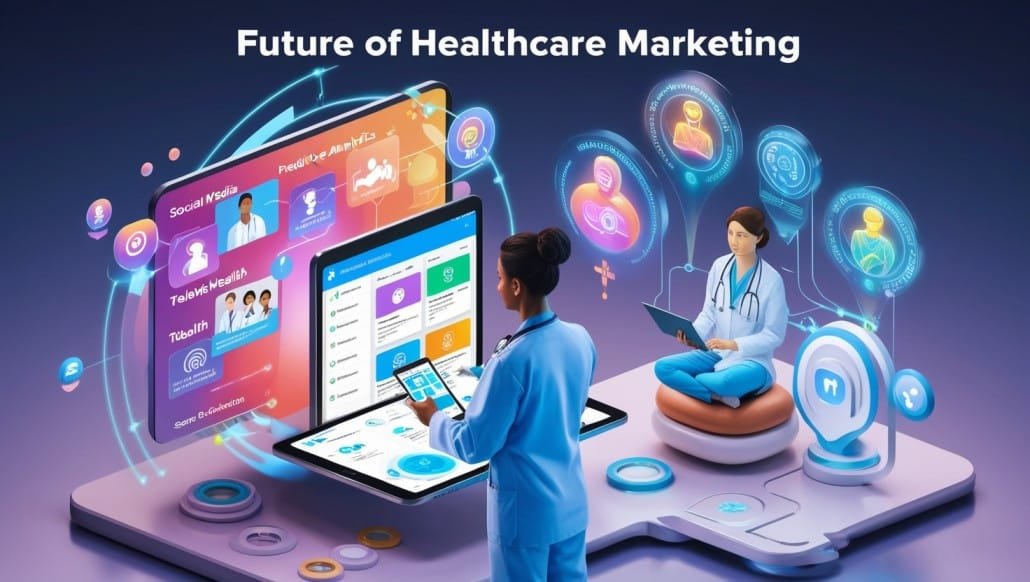Welcome to a look into how digital marketing is transforming the healthcare world. In this blog post, we’ll explore the *Future of Healthcare Marketing* and what this means for practices and patients alike. Digital marketing is creating opportunities for healthcare providers to connect with patients in new, more personal ways. We’ll walk you through the latest trends, key benefits, and practical strategies that make healthcare marketing impactful, accessible, and patient-focused.
As you read, think about how these approaches could make a difference in your own healthcare practice or experience. Have you ever thought about the ways digital marketing could improve patient care, trust, or convenience? We’d love to hear your thoughts in the comments!
—
What Digital Marketing Looks Like in Healthcare
When it comes to digital marketing in healthcare, think of it as a way for providers to engage with patients online, offering information, building trust, and ultimately helping people find the right care. This goes beyond traditional advertising, reaching patients where they already spend time—search engines, social media, and health information websites.
Healthcare marketing today isn’t just about visibility; it’s about creating meaningful connections. Patients looking for a healthcare provider often want more than just a name; they want to see credentials, real patient stories, and useful health information. An effective digital strategy can position a practice as approachable and knowledgeable, qualities patients value.
Every part of the patient journey matters—from the first online search to their visit and beyond. With digital marketing, healthcare practices can ensure each step respects patients’ needs, making care more accessible and compassionate.
—
Why Digital Marketing Matters in Healthcare
Digital marketing has become more than just a tool for patient acquisition. It’s now a way to enhance the overall experience, from initial searches to follow-ups. Here are some key ways digital marketing can make a difference for healthcare providers:
Better Visibility: With so many people looking for healthcare services online, a strong digital presence ensures your practice appears in their searches. This makes it easier for new patients to find you and learn more about your services.
Personalized Patient Experience: Patients want a healthcare experience that feels customized. Through digital marketing, providers can reach out with personalized content, helpful information, and tailored reminders. This fosters trust and builds relationships.
Direct Patient Communication: Digital marketing makes it easy for healthcare practices to share important updates, health tips, and reminders with patients. This kind of consistent, meaningful communication helps keep patients engaged and informed.
Cost-Efficient: Digital marketing offers a budget-friendly way to reach more people compared to traditional ads. By targeting specific groups with online ads or content, practices can attract new patients without overextending their budget.
These benefits show how digital marketing does more than just market services; it makes patient care more convenient and trustworthy. It also helps build a foundation for future growth and adaptability.

Trends in Healthcare Digital Marketing to Watch
Healthcare marketing is evolving quickly. Here are some of the top trends shaping the *Future of Healthcare Marketing* that healthcare providers can start using today:
Telehealth Promotion: Since more patients are open to virtual consultations, promoting telehealth services online helps meet this demand. By integrating telehealth into digital strategies, practices make healthcare more accessible.
Content Marketing: Patients are seeking information on health topics long before they book appointments. Blogs, videos, and other types of content help provide value and establish your practice as a trusted resource for health information.
Search Engine Optimization (SEO): Most people turn to search engines when looking for healthcare providers, so being easy to find on Google is essential. By optimizing website content with healthcare-specific keywords, practices can boost their visibility in search results.
Social Media Engagement: Social media allows practices to interact with patients, share health insights, and create a community. It’s an effective way to build patient loyalty and connect on a more personal level.
AI Chatbots and Virtual Assistants: These tools are helpful for answering basic patient questions, scheduling appointments, and providing quick information. Chatbots can create a smoother, more immediate experience for patients reaching out to your practice.
By staying on top of these trends, healthcare providers can ensure they’re not only meeting patient expectations but also setting themselves up for long-term success.
—
How Healthcare Providers Are Using Digital Marketing Today
Healthcare practices today are actively using digital marketing to better connect with patients, promote wellness, and share important information. Social media, for instance, has become a valuable tool for healthcare providers to raise awareness about health issues and share preventative tips.
Email marketing is another way to stay in touch. From appointment reminders to health tips, regular email updates help practices stay connected with patients, building trust and keeping patients informed.
Many practices also use online ads to reach specific audiences, like expectant parents or those managing chronic conditions. This targeted approach makes it easy for practices to reach people who could benefit from their services.
By combining these efforts, healthcare providers are not only responding to today’s patient needs—they’re also preparing for future changes in how people interact with healthcare.
—
Digital Transformation in Healthcare: Why It’s Important
Digital transformation is about more than just adding new tools; it’s a way of making healthcare more patient-centered and efficient. Through digital transformation, practices can automate tasks like appointment scheduling, reminders, and follow-ups, which frees up time for the healthcare team and creates a better patient experience.
In an era where convenience is key, patients expect their healthcare providers to be accessible. Embracing digital tools shows that a practice is innovative and committed to meeting patients’ needs. Whether it’s through online forms, virtual consultations, or easy-access health information, digital tools allow patients to engage with healthcare on their terms.
The *Future of Healthcare Marketing* will depend on how practices use digital transformation to improve patient access and streamline processes. Patients today are more informed and expect healthcare that fits into their lives—not the other way around. Digital tools meet that need, making healthcare more convenient and adaptable.
—
Digital Marketing Strategies Every Healthcare Practice Should Use
Here are some digital marketing strategies that can help healthcare practices reach more patients and build lasting relationships:
Local SEO: Optimizing for local searches is key for practices wanting to attract nearby patients. This includes using location-based keywords and listing your practice on Google My Business.
Content Marketing: Publishing blogs, articles, or videos that address common health concerns helps patients feel informed and cared for. This type of content can also help your practice rank higher in search results.
Email Campaigns: Consistent email communication with patients is a great way to share valuable information, updates, and reminders. It’s a friendly way to stay connected without being intrusive.
Social Media: Active social media profiles allow healthcare providers to engage with patients, share valuable health tips, and build a sense of community.
Online Reviews: Positive reviews can make a significant difference for potential patients considering your practice. Engaging with reviews, both good and bad, helps build credibility and trust.
6. PPC Advertising: Pay-per-click advertising allows practices to reach specific groups, like young families or seniors, effectively. PPC ads are budget-friendly and can drive traffic to your site quickly.
These strategies help build a strong digital presence, making it easy for patients to find, engage, and trust your practice.
—
What the Future Holds for Digital Marketing in Healthcare
The *Future of Healthcare Marketing* is promising and full of opportunities to improve patient experience through digital innovation. Here are a few trends to keep an eye on:
VR and AR: These technologies can help with patient education and even train healthcare staff, offering immersive learning experiences for both patients and providers.
Predictive Analytics: Data can now predict what types of care or information patients may need, making it possible to tailor communication in a way that’s meaningful to each patient.
Voice Search Optimization: As more people use voice-activated searches, practices should consider adapting content to match how patients talk and ask questions about their health.
Advanced AI: AI can assist healthcare practices in analyzing patient data, managing communications, and improving care quality, making patient experiences faster and more reliable.
Digital marketing in healthcare is set to evolve with these technologies, enabling a more personalized, patient-centered future.
—
Wrapping Up
As we look to the *Future of Healthcare Marketing*, it’s clear that digital strategies will play a huge role in creating a healthcare system that’s more accessible, responsive, and patient-focused. By investing in digital marketing, healthcare practices aren’t just adapting to a trend—they’re paving the way for a more connected, compassionate healthcare experience.
Whether you’re a healthcare professional or someone interested in the future of healthcare, we hope this blog gave you a fresh perspective. How do you think digital marketing could improve healthcare? Do you have any ideas for your own practice or patient experience? Share your thoughts, and feel free to reach out if you’d like to learn more!



